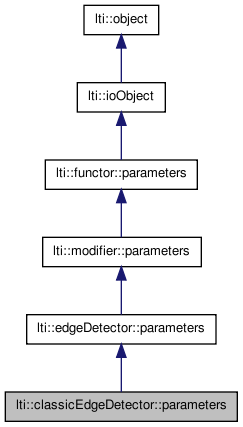

|
latest version v1.9 - last update 10 Apr 2010 |
|
The parameters for the class classicEdgeDetector. More...
#include <ltiClassicEdgeDetector.h>


The parameters for the class classicEdgeDetector.
enum type for maxima search method
| NonMaximaSuppression |
use an instance of nonMaximaSuprression to extract edges |
| Thresholding |
use an instance of thresholding to extract edges |
| lti::classicEdgeDetector::parameters::parameters | ( | ) |
default constructor
Reimplemented from lti::edgeDetector::parameters.
| lti::classicEdgeDetector::parameters::parameters | ( | const parameters & | other | ) |
copy constructor
| other | the parametrs object to copied |
Reimplemented from lti::edgeDetector::parameters.
| lti::classicEdgeDetector::parameters::~parameters | ( | ) | [virtual] |
destructor
Reimplemented from lti::edgeDetector::parameters.
| void lti::classicEdgeDetector::parameters::attachMaximaSearchMethod | ( | nonMaximaSuppression * | suppressor | ) |
Sets a new maxima search method.
The functor which is passed here as an argument must have been allocated with new; it must not be a local variable. On destruction of the parameters object, the instance of the given functor will be deleted, i.e. this parameters instance will be responsible for the memory managment of the object.
Attention: some parameters of the functor will be overwritten in classicEdgeDetector::setParameters();
| void lti::classicEdgeDetector::parameters::attachMaximaSearchMethod | ( | thresholding * | thresholder | ) |
Sets a new maxima search method.
The functor which is passed here as an argument must have been allocated with new; it must not be a local variable. On destruction of the parameters object, the instance of the given functor will be deleted, i.e. this parameters instance will be responsible for the memory managment of the object.
Attention: some parameters of the functor will be overwritten in classicEdgeDetector::setParameters();
| virtual functor::parameters* lti::classicEdgeDetector::parameters::clone | ( | ) | const [virtual] |
Returns a pointer to a clone of the parameters.
Reimplemented from lti::edgeDetector::parameters.
| parameters& lti::classicEdgeDetector::parameters::copy | ( | const parameters & | other | ) |
copy the contents of a parameters object
| other | the parameters object to be copied |
Reimplemented from lti::edgeDetector::parameters.
| const char* lti::classicEdgeDetector::parameters::getTypeName | ( | ) | const [virtual] |
returns name of this type
Reimplemented from lti::edgeDetector::parameters.
| parameters& lti::classicEdgeDetector::parameters::operator= | ( | const parameters & | other | ) |
Copy the contents of a parameters object.
| other | the parameters object to be copied |
Reimplemented from lti::edgeDetector::parameters.
| virtual bool lti::classicEdgeDetector::parameters::read | ( | ioHandler & | handler, | |
| const bool | complete = true | |||
| ) | [virtual] |
Read the parameters from the given ioHandler Note: The parameters of the used maxima search method will NOT be read!
| handler | the ioHandler to be used | |
| complete | if true (the default) the enclosing begin/end will be also written, otherwise only the data block will be written. |
Reimplemented from lti::edgeDetector::parameters.
| void lti::classicEdgeDetector::parameters::setMaximaSearchMethod | ( | const nonMaximaSuppression & | suppressor | ) |
Sets a new maxima search method.
A copy of the functor will be done (so it is useless to change the parameters of the given functor instance, because the internal functor will never notice the changes done to its "parent").
Attention: some parameters of the functor will be overwritten in classicEdgeDetector::setParameters(const functor::parameters& theParam);
| void lti::classicEdgeDetector::parameters::setMaximaSearchMethod | ( | const thresholding & | thresholder | ) |
Sets a new maxima search method.
A copy of the functor will be done (so it is useless to change the parameters of the given functor instance, because the internal functor will never notice the changes done to its "parent").
Attention: some parameters of the functor will be overwritten in classicEdgeDetector::setParameters(const functor::parameters& theParam);
| void lti::classicEdgeDetector::parameters::useExternalMaximaSearchMethod | ( | nonMaximaSuppression * | suppressor | ) |
Sets a new maxima search method.
The functor which is passed here as an argument is not deleted by the parameters object, the caller must ensure that threre are no memory leaks.
Attention: some parameters of the functor will be overwritten in classicEdgeDetector::setParameters();
| void lti::classicEdgeDetector::parameters::useExternalMaximaSearchMethod | ( | thresholding * | thresholder | ) |
Sets a new maxima search method.
The functor which is passed here as an argument is not deleted by the parameters object, the caller must ensure that threre are no memory leaks.
Attention: some parameters of the functor will be overwritten in classicEdgeDetector::setParameters();
| virtual bool lti::classicEdgeDetector::parameters::write | ( | ioHandler & | handler, | |
| const bool | complete = true | |||
| ) | const [virtual] |
Write the parameters in the given ioHandler.
Note: The parameters of the used maxima search method will NOT be saved!
| handler | the ioHandler to be used | |
| complete | if true (the default) the enclosing begin/end will be also written, otherwise only the data block will be written. |
Reimplemented from lti::edgeDetector::parameters.
bool lti::classicEdgeDetector::parameters::destroyFunctor [protected] |
Parameters of gradientFunctor which is used to compute the Gradients.
Default value: parameters with KernelType = Sobel.
Method which is used to get the edges out of the gradient.
Default value: nonMaximaSuppression
non maxima suppression functor.
Default value: default nonMaximaSuppression
Default value: 0